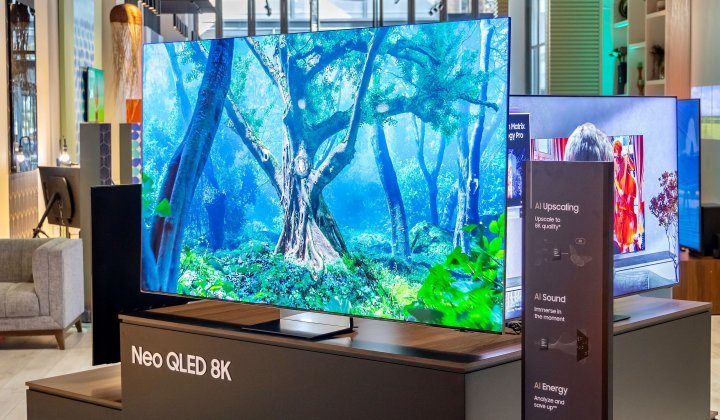Generative AI's impact on the creative economy is undeniable. Its roots, deeply embedded in technological evolution, have reshaped the landscape of music consumption and creation. As we navigate this evolving landscape, however, it is imperative to consider both the opportunities and challenges presented by these advancements.
In the realm of artistic creation, a philosophical quandary often arises: if you remove the paintbrush from an artist's hand, does the resulting work still bear the essence of its creator? This question, both timeless and deeply pertinent, invites us to explore the intricate relationship between artist and medium.
My journey through this landscape of inquiry is deeply intertwined with the resonant melodies of renowned South African songstress Sibongile Khumalo, a figure who transcended the conventional role of a musician. To me, she was not just an aunt and Ayanda's mother but an exceptional human being whose music has offered solace and empowerment in moments of both triumph and disappointment, acting as a gentle reminder of my identity.
Now as we delve into the evolving intersection of art and technology, particularly in the realm of music, her enduring legacy offers a poignant backdrop to a conversation that is as much about the future of creativity as it is a reflection on the past. Regrettably, Khumalo’s demise in 2021 marked an era of silence in many ways. Although her illustrious discography continues to bring joy, one cannot help but ponder the potential compositions that could have emerged post-Covid – with the use of generative AI. This thought has led me to further contemplate the potential of artificial intelligence in the realm of music creation.
When considering songstress and music legend Lira's recent loss of vocal ability, for example, could AI provide a solution? The idea of an artist like her penning lyrics, with AI tools executing the vocal performance, presents a fascinating, albeit complex, scenario. As an academic and creative professional, I have integrated tools like ChatGPT and various AI-based creative platforms into my daily workflow for tasks such as email editing, understanding new topics, and creating presentation visuals. This integration, however, prompts a critical reflection on the implications of accessible AI tools for the creative economy. Are we witnessing the dawn of a new era or the twilight of an existing one in the creative industries?
To be or not to be?
Generative AI's impact on the creative economy is undeniable. Its roots, deeply embedded in technological evolution, have reshaped the landscape of music consumption and creation. From the Walkman revolution to the advent of streaming services like Apple Music and Spotify, technology has continually redefined our musical experiences.
As we navigate this evolving landscape, it is imperative to consider both the opportunities and challenges presented by these advancements. From enhancing personal workflows to reshaping the entire music production landscape, AI's influence is immeasurable. This influence, however, comes with significant ethical, legal, and economic implications, particularly concerning copyright and the value of human creativity in the digital age.
That said, rapid advancements in AI, exemplified by the emergence of music AI such as Stability AI and various other platforms, have significantly outpaced policy and ethical considerations. In the realm of generative AI music, Ed Newton-Rex has been a pivotal figure, who has made substantial contributions. Founding Jukedeck and later contributing to TikTok/ByteDance and Stability AI, he developed Stable Audio, acclaimed as one of Time magazine's Best Inventions of 2023.
His recent resignation from Stability AI, prompted by concerns over copyright ethics, underscores the growing discourse on intellectual property in AI. Despite acknowledging the thoughtful approach of many at Stability AI and expressing gratitude for the opportunity to develop a state-of-the-art AI music generation product with licensed data, Newton-Rex found the company's prevailing opinion on fair use irreconcilable with his own views.
Stability AI, along with other major AI and tech companies, maintains that training AI models on copyrighted works falls under "fair use". This perspective, as outlined in their 23-page submission to the US Copyright Office, asserts that AI development is a transformative and socially beneficial use of existing content. Newton-Rex challenges this view, citing a key factor in determining fair use: the impact of such use on the market value of the copyrighted work. He argues that generative AI models, capable of creating works competing with original copyrighted material, cannot justifiably claim fair use under this criterion.
Newton-Rex's stance reflects a growing discourse within the tech and creative industries about the ethical and legal implications of AI in creative processes, underscoring the need for a nuanced approach to copyright in the age of AI.
Copyrights can lead to copy wrongs
In 2023, the emerging pop artist Tyla's hit single Water achieved viral success, amassing over 72 million views on its official music video in just a couple of months. This popularity sparked an intriguing phenomenon: within days of its release, more than six AI-generated cover versions of the song appeared. This example illustrates the profound impact of AI on the music industry, highlighting both the potential benefits and the complex challenges it poses.
The AI-generated versions of Water, featuring virtual renditions of artists like Beyoncé, Drake, and Justin Bieber, were not only imitations. They were AI's interpretation of the song, based on its beat, lyrics, and tone. To the untrained ear, these versions could easily be mistaken for studio recordings, with some listeners even opining that they were superior to the original.
This development brings to light several critical issues in the intersection of AI and music production. Firstly, it raises questions about copyright and ownership. Who owns the rights to these AI-generated versions? Should Tyla, the original artist, be entitled to royalties from these covers? Should the YouTube covers be demonitised or should the revenue go to the original artist? These questions are not merely hypothetical; they are currently the subject of ongoing legal debates and lawsuits, challenging traditional notions of intellectual property in the music industry.
Moreover, the case of Water underscores the socio-economic, political, and ethical implications of AI in music. The ease with which AI can generate high-quality music raises concerns about the future role of human musicians. While AI offers incredible opportunities for innovation and accessibility, it also poses a threat to the livelihoods of artists, especially emerging ones like Tyla, whose careers are still in their nascent stages.
This case exemplifies the double-edged sword that is AI in music production. On one hand, it offers a glimpse into a future where AI can augment the creative process, providing new tools for artists to explore. On the other hand, it highlights the urgent need for a legal and ethical framework that can adapt to the rapidly evolving landscape of AI-generated content. As the music industry continues to grapple with these challenges, the case of Water will likely serve as a reference point for future discussions on the role of AI in creative expression.
What happens next?
The journey through the realms of AI in music and the broader creative economy reveals a landscape rich with innovation, opportunity, and profound challenges. As we stand at this crossroads, it is clear that the integration of AI in creative processes is not just a technological evolution but a cultural shift that redefines the boundaries of artistry and creativity.
As we look to the future, it is evident that the arts remain a challenging yet rewarding field, filled with more trials than triumphs. In an era where artists often struggle to sustain their careers, the advent of AI in the creative economy offers both hope and caution. While AI can augment and amplify human creativity, offering new avenues for expression and innovation, it should not replace the human touch that is the essence of art.
Some voices have called for a more balanced approach to copyright, one that recognises both the rights of creators and the needs of the public, suggesting reforms to adapt to the digital age. This balance or absence thereof is what led to Newton-Rex’s resignation based on the principle that AI generative tools should not be allowed to own the copyright of work created based on the sound or artists living or posthumous. This development highlights the urgent need for policy evolution to keep pace with technological innovation.
The balance between embracing AI's potential and preserving the sanctity of human creativity is delicate. As we navigate this new era, it is crucial to develop frameworks and policies that protect the rights and livelihoods of creators while fostering the growth and evolution of the creative industries. This balance will ensure that the painter continues to paint, the musician continues to pen lyrics, and the unique human experience remains at the heart of artistic expression.
In the end, the power of music, art, and creativity lies in their ability to connect individual experiences to the universal human condition. As we embrace the possibilities of AI, let us not lose sight of this fundamental truth. The future of the creative economy should be one where technology serves as a tool for human expression, not a replacement for it, ensuring that the arts continue to enrich our lives and culture for generations to come.
*Disclaimer: While AI was used to edit the article, all original content was written by the author.
KEY TAKEAWAYS
- AI provides opportunities and challenges for the creative industry that need to be fully explored.
- The ethical and legal implications of AI in creative processes continue to drive conversation within the tech and creative industries.
- While AI can augment and amplify human creativity, it should not replace the human touch that is the essence of art.
Listen for yourself
- Khumalo, S. (1996). Little Girl. On Ancient Echoes. Sony Music Entertainment South Africa.
- Lira. (2008). Soul in Mind. On Soul in Mind. Sony Music Entertainment Africa (Pty) Ltd.
- Tyla (2023). Water. 2023 FAX Records under exclusive license to Epic Records, a division of Sony Music Entertainment.
Dr. Nobulali Dangazele has been a lecturer at GIBS since 2021. Before joining GIBS, she thrived as an award-winning producer while pursuing a Master’s degree in dramatic arts. She is a Mandela Rhodes Scholar, with a PhD from Warwick Business School. Dr. Dangazele brings a wealth of diverse experience using the arts to inform her research, teaching, and facilitation. She believes that authenticity is imperative for leadership and meaningful impact. Her teaching and research interests are in strategy, experiential learning, behavioural insights (Nudge), symbolic interaction, leadership, and applied theatre.







